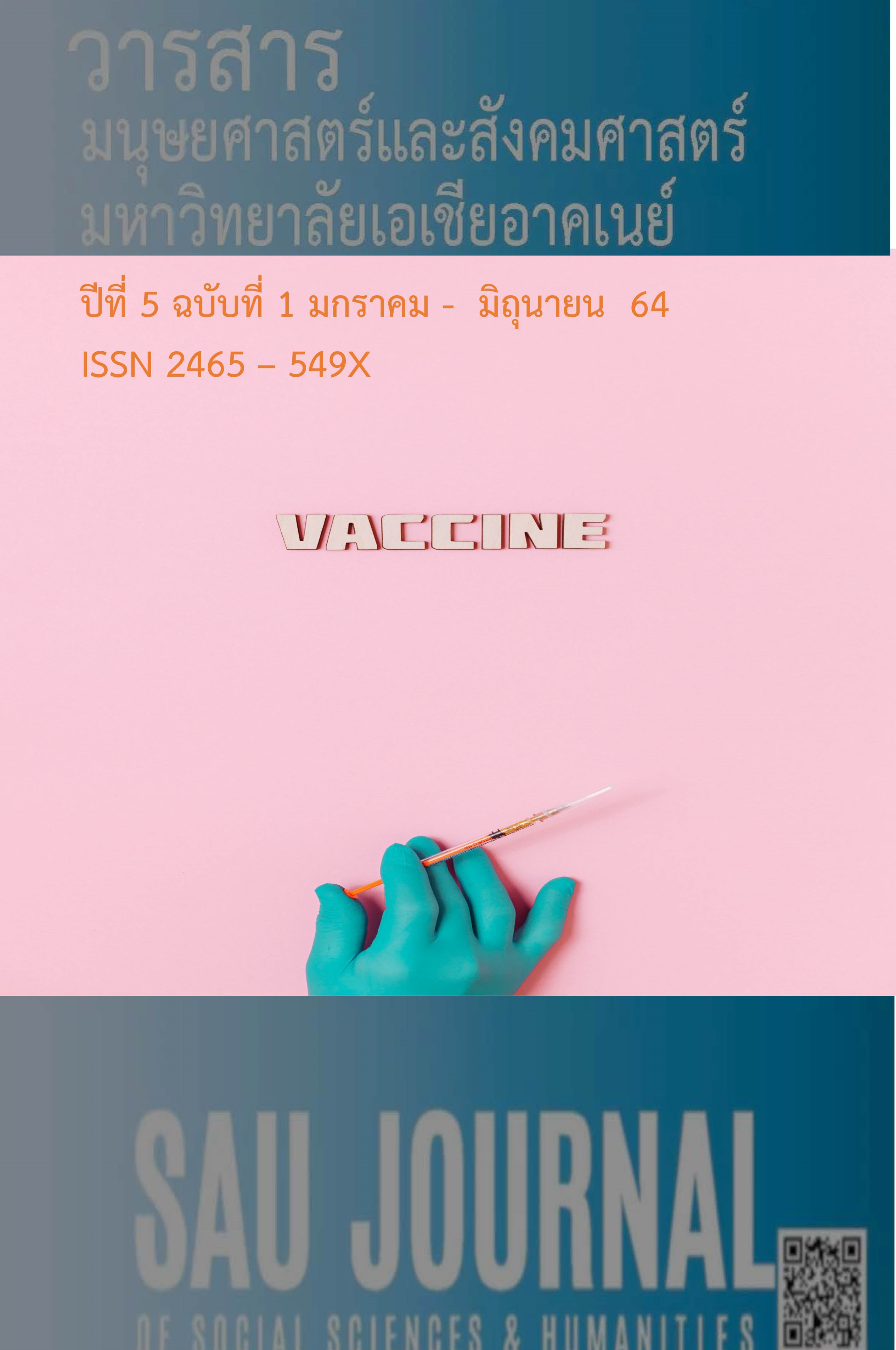อิทธิพลของการสื่อสารแบบปากต่อปากทางอิเล็กทรอนิกส์ และทัศนคติต่อการท่องเที่ยวภายในประเทศ ที่มีต่อความตั้งใจท่องเที่ยวของนักท่องเที่ยวชาวไทย
คำสำคัญ:
ทัศนคติ, การสื่อสารแบบปากต่อปากทางอิเล็กทรอนิกส์, ความตั้งใจท่องเที่ยวบทคัดย่อ
วัตถุประสงค์ของการศึกษา เพื่อศึกษาอิทธิพลของการสื่อสารแบบปากต่อปากทางอิเล็กทรอนิกส์ และทัศนคติต่อการท่องเที่ยวภายในประเทศ ที่มีผลต่อความตั้งใจท่องเที่ยว กลุ่มตัวอย่างที่ใช้ในการวิจัย เป็นกลุ่มนักท่องเที่ยวชาวไทยที่ได้เดินทางไปท่องเที่ยวภายในประเทศ ในช่วงตั้งแต่มีการแพร่ระบาดของ COVID-19 จำนวน 310 คน ใช้แบบสอบถามเป็นเครื่องมือในการเก็บรวบรวมข้อมูล ใช้การสุ่มแบบสะดวก (convenience sampling) ผ่านทาง Social Network สถิติที่ใช้ในการทดสอบสมมุติฐาน ใช้การวิเคราะห์สัมประสิทธิ์สัมพันธ์เพียร์สัน (Pearson’s Correlation Coefficient) และวิธีการวิเคราะห์ความถดถอยเชิงพหุ (Multiple Regression Analysis) ที่ระดับนัยสำคัญทางสถิติ 0.01 ผลการวิจัย พบว่า การสื่อสารแบบปากต่อปากทางอิเล็กทรอนิกส์ และทัศนคติมีอิทธิพลต่อความตั้งใจท่องเที่ยวภายในประเทศของนักท่องเที่ยวชาวไทย และพบว่าทัศนคติของนักท่องเที่ยวชาวไทย มีอิทธิพลมากกว่า การสื่อสารแบบปากต่อปากทางอิเล็กทรอนิกส์โดย มีค่าสัมประสิทธิ์อยู่ที่ 0.547 และ 0.153 ตามลำดับ และสามารถทำนายผลความตั้งใจท่องเที่ยวได้ร้อยละ 31.3
เอกสารอ้างอิง
Abubakar Mohammed Abubakar. 2016. “Does eWom influence destination trust and travel intention: a medical tourism perspective.” Economic Research Ekonomska. 2016 (29): 598-611.
Albarq A.N., 2014. “Measuring the Impacts of Online Word-of-Mouth on Tourists’ Attitude and Intentions to Visit Jordan: An Empirical Study.” International Business Research, 7(1) 14-22
Ajzen, I. 2001, Attitudes, Annual Review of Psychology, 52, 27-58.
Cochran, W. G. 1997. Sampling Techniques. 3rd New York: John Wiley & Sons.
Eunha, J., & Soocheong, J. 2011. “Restaurant experiences triggering positive eWOM motivations”. International Journal of Hospitality Management, 30, 356-366.
Fakharyan, M., Jalilvand, M., Eyasi, M., & Mohammadi, M. 2012. “The influence of online word of mouth communications on tourists’ attitudes toward Islamic destinations and travel intention: Evidence from Iran”. African Journal of Business Management, 6(38), 10381-10388.
Gretzel, U., Yoo, K. H. & Purifoy, M. 2007. Online travel review study: Role & impact of online travel reviews. College Station, TX: Texas A&M University, Laboratory for Intelligent Systems in Tourism.
Jalilvand, M. R., & Samiei, N. 2012. “The Effect of Word of Mouth on Inbound Tourists Decision for Travelling to Isfahan as a Tourism Destination in an Islamic Republic”. Journal of Islamic Marketing, 3(1), 12-26.
Jalilvand, M.R., Ebrahimi A., Samiei, N. 2013. “Electronic Word of Mouth Effect on Tourist’s Attitude Toward Islamic Destinations and Travel Intention: an Empirical Study in Iran.” Procedia – Social and Behavioral Sciences 2013 (VOL 81): 484 – 489.
Kraus, S. J. (1995), Attitudes and the prediction of behavior: a meta-analysis of the empirical Literature, Personality and Social Psychology Bulletin, 21, 58-75.
Litvin SW, Goldsmith RE, Pan B. 2008. “Electronic word-of-mouth in hospitality and tourism management.” Tourism Management. 2008: 458 – 468.
Lin, P., Jones, E., & Westwood, S. 2009. “Perceived risk and risk relievers in online travel purchase intentions”. Journal of Hospitality Marketing & Management, 18, 782-810.
Soares, A. M., Pinho, J. C., & Nobre, H. 2012. “From Social to marketing interactions: The role of social networks”. Journal of Transnational Management, 17, 45 – 62.
Yulin Miao. 2015. “The Influence of Electronic-WOM on tourists’ Behavioral Intention to Choose A Destination: A Case of Chinese Tourist Visiting Thailand.” AU-GSB e-Journal, 8 (1) : 13-31
Zarrad H. and Debabi M. 2015. “Analyzing the Effect of Electronic Word of Mouth on Tourists’ attitude toward Destination and Travel Intention.” International Research Journal of Social Sciences (Vol.4): 53-60.
Zhu, M., & Lai, S. 2009. “A study about the WOM influence on tourism destination choice.” paper presented at the International Conference on Electronic Commerce and Business Intelligence (ECBI), 6-7 June, Beijing, China.






